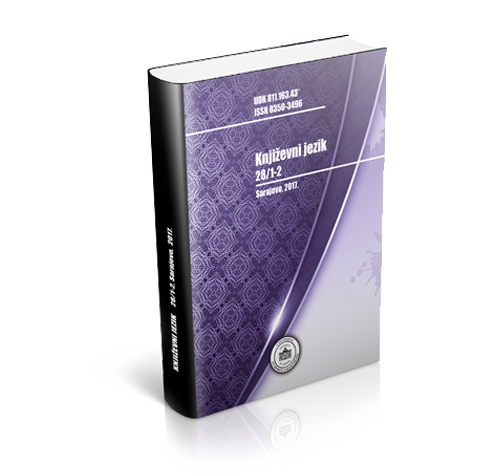Придјевске творенице у вишечланим терминима
Transformationally Derived Adjectives in Complex Noun Phrases
Author(s): Eugenije Barić, Marko LukendaSubject(s): Theoretical Linguistics, South Slavic Languages, Phraseology
Published by: Institut za jezik
Keywords: adjective; noun phrase; word transformation; modifying construction; genitive; accusative;
Summary/Abstract: The modifying construction itself may consist of one word noun peći like in vrata peći or it may be a complex noun phrase like visokog tlaka in kotao visokog tlaka. It may also be a prepositional phrase na plin in štednjak na plin. It is quite common for prepositional phrases to function as modifiers of larger constructions. The central purpose of this article is to investigate the possibilities of transforming the complex modifying structures into a modifying (pre-modifying) adjective. When a post-modifier is a single noun it cam beastly transformed into a pre-modifying adjective except in the following cases: a) when the post-modifying noun is inflected for partitive genitive (kutija keksa), b) when the object is in genitive case and the noun functions as object is a mass noun (bacač snijega). Sometimes the contraint blocking this transformation may be conditioned by the phonetic shape of the post-modifying noun (izolator mehanizma). There are also other cases when this transformation is blocked. As fox the complex post-modifying structures the exist to apply this transformation, to are those containing such adjectives as visok, nizak, tanak, uzak, cijel, dug, or a number, into an adjective with, a suffix added to its base. Among adjectival transforms one often finds, adjective compounds containing adverbs malo, puno, visoko as well as the prefix polu. Among the prepositional phrases the preposition combines with the nouns inflected for: genitive, accusative, locative and instrumental. The prepositional phrases, containing the prepositions bez, izvan, protiv and među and followed by the noun inflected for genitive can be transformed into a pre-modifying adjective containing both the prefix and suffix as a result of the transformation applied to the prepositional phrase. The same thing happens when the locative noun is preceded by a preposition pri (in its literal meaning) as well as with the instrumental nouns preceded by pod and nad. On the other hand adjectives containing suffixes are transformationally derived a) from genitive NPs preceded by od b) from accusative NPs preceded by za and na. There are, however, constraints to this transformational relationship since klješta za lim cannot be transformed into limena kliješta, komora za gašenje into gasna komora. The authors conclude that in usage those NPs containing pre-modifiying adjectives are more frequently. There are cases when morphologically different phrases kotač automobila i kotač za automobil, which also- differ in meaning, can be transformed into one adjectival premodfier-automobilski which neutralizes their respective differences. However, the final conclusion of this article is that the transformations for changing complex nominal or prepositional postmodifiers should be applied whenever it is possible, because the principle of structural compression favors adjectival premodifiers and because they seem to be more frequent in usage.
Journal: Književni jezik
- Issue Year: 15/1986
- Issue No: 2
- Page Range: 107-116
- Page Count: 10
- Language: Croatian

